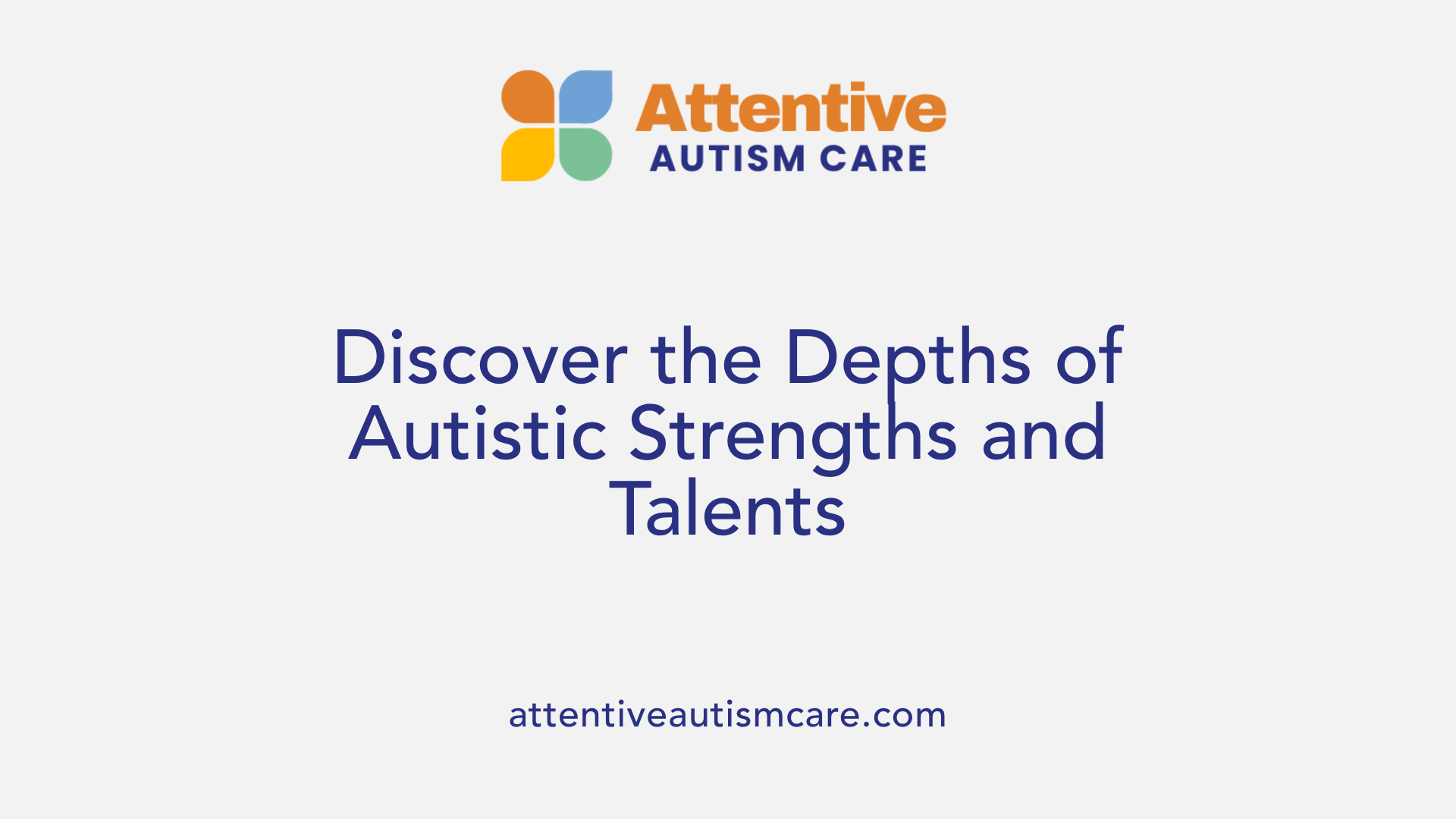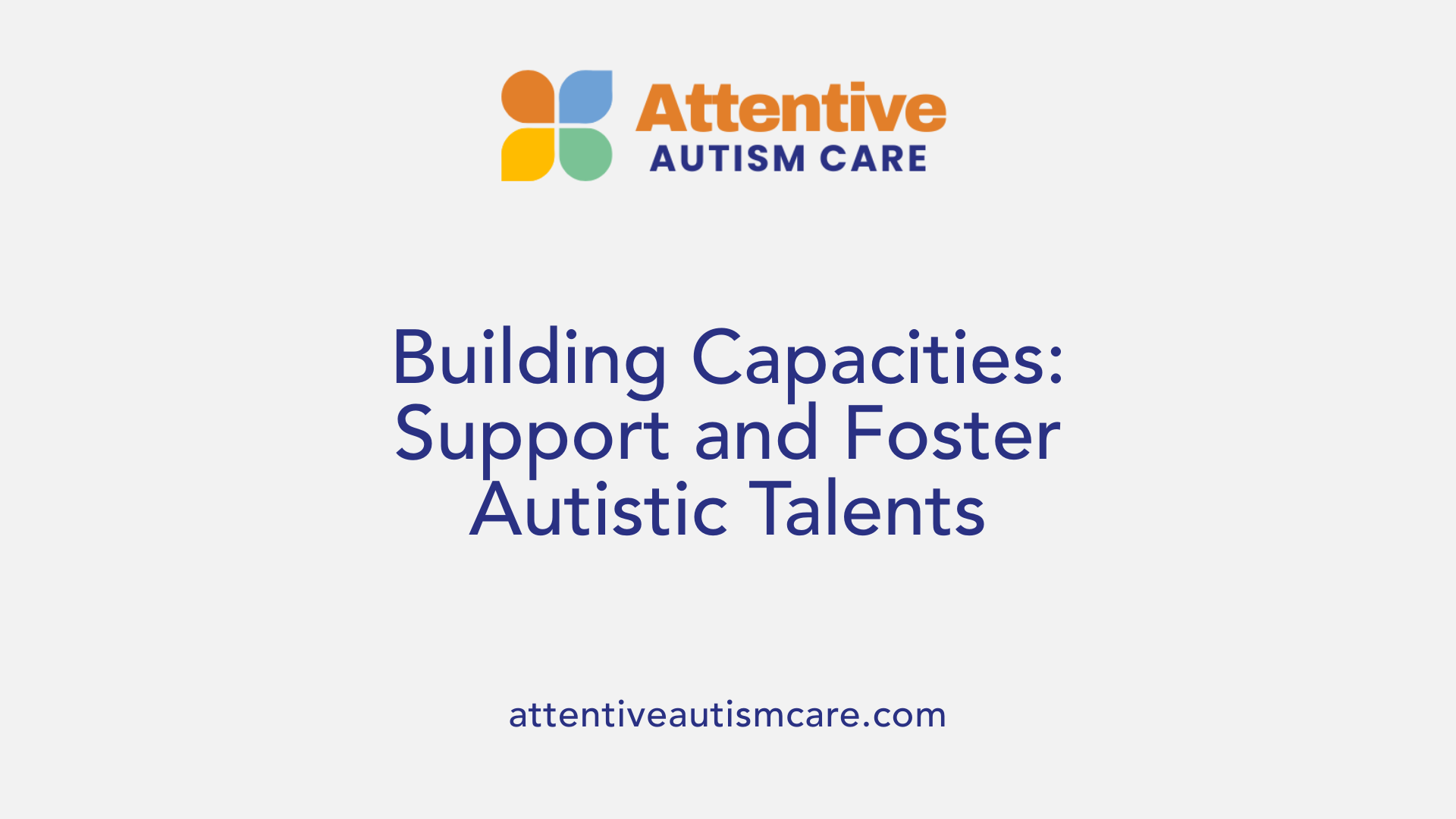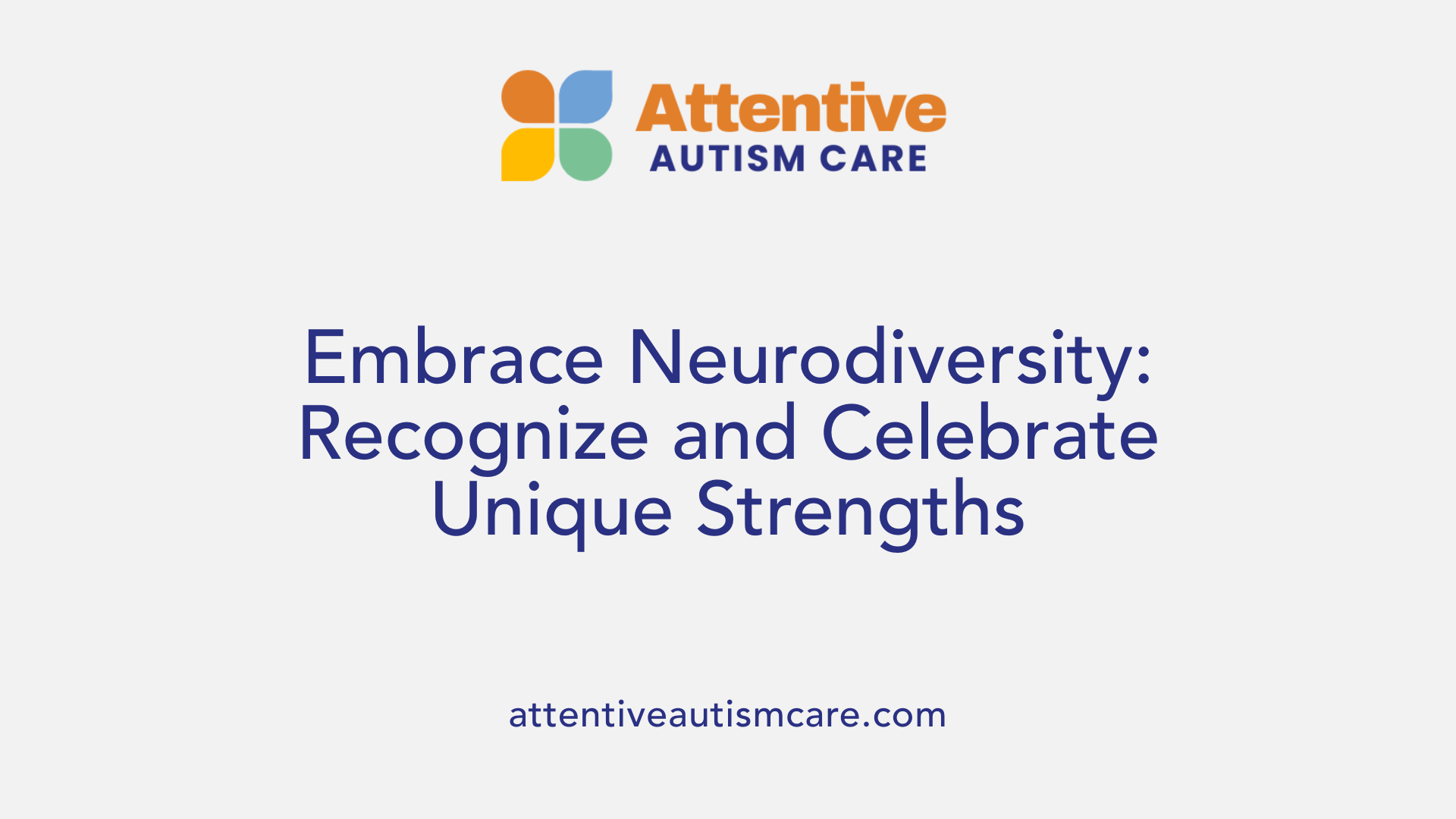Strengths and Abilities In Autism
Celebrating the Unique Strengths of Autistic Individuals

Understanding Autism’s Positive Traits
Autism is often associated with challenges, but it also encompasses a wide array of remarkable strengths and abilities that can significantly enhance individual lives and society as a whole. Recognizing and nurturing these strengths not only supports autistic individuals' growth and well-being but also enriches our collective progress. This article explores the diverse talents, characteristics, and potential that autism and neurodiversity bring to the world, emphasizing a strengths-based perspective that promotes inclusion, innovation, and understanding.
The Advantages of Neurodiversity and Autism’s Unique Abilities
What are the advantages of neurodiversity and autism's unique abilities?
Autistic individuals contribute a wealth of strengths that benefit society in numerous ways. Their exceptional memory, sharp attention to detail, and heightened pattern recognition enable them to analyze complex data, solve intricate problems, and develop innovative solutions.
Many autistic people demonstrate savant skills, especially in areas like mathematics, music, and visual arts. These extraordinary talents often lead to breakthroughs in scientific research, technological development, and creative industries.
The unique cognitive profiles of autistic individuals foster a culture of innovation. Their different ways of thinking and perceiving the world can inspire new ideas and approaches that neurotypical minds might overlook.
Creating inclusive environments that value diverse problem-solving styles enhances collaboration, productivity, and creativity. When society recognizes the worth of these strengths, it not only supports autistic individuals but also advances overall societal progress.
Focusing on these abilities encourages a perspective shift—viewing neurodiversity as a vital resource rather than a challenge. This approach promotes education, employment, and social inclusion, strengthening communities and fostering mutual understanding.
| Strengths of Neurodiversity | Examples | Impact on Society |
|---|---|---|
| Cognitive skills | Memory, pattern recognition, problem-solving | Innovation, scientific discoveries |
| Artistic and musical talents | Visual art, music, savant skills | Cultural enrichment, technological advancement |
| Focus and expertise | Deep interest in specific topics | Specialized innovations, niche expert contributions |
| Sensory perceptions | Heightened senses like perfect pitch or visual sensitivity | New artistic and sensory-based solutions |
Recognizing these distinctive abilities underscores the importance of neurodiversity. Harnessing these strengths leads to richer, more dynamic communities where everyone’s talents contribute to collective growth.
Autistic Strengths and Talents: A Deep Dive

What are some strengths and abilities of individuals with autism?
Autistic individuals often have a remarkable array of strengths and skills that stand out and contribute uniquely to society. One notable feature is their ability to develop deep expertise in their favorite topics, known as special interests. This intense focus often results in exceptional knowledge and skills, making them highly proficient and creative in areas like arts, music, or technical subjects.
They are also known for their heightened attention to detail and excellent memory capabilities. Many autistic people memorise vast amounts of information quickly and recall facts with remarkable accuracy. This sharp focus complements their ability to notice visual and sensory details that others might overlook.
Creativity is another prominent strength, with many excelling in the arts—creating visually striking artwork, composing music, or engaging in innovative problem-solving through pattern recognition. Their creative pursuits are often fueled by a vivid imagination and a unique perspective.
Honesty and loyalty are character traits frequently associated with autistic individuals. Their straightforward communication and deep sense of trustworthiness foster strong and genuine relationships. Additionally, many are driven by a strong sense of justice and empathy, motivating them to advocate for fairness and social causes.
Some autistic individuals exhibit extraordinary talents, known as savant skills, such as calendar calculation, perfect pitch, and advanced pattern recognition. These specialized abilities often coexist with other developmental challenges but showcase the remarkable diversity of strengths within the autism spectrum.
Overall, understanding and building on these abilities can empower autistic individuals to thrive in education, careers, and social life, highlighting their invaluable contribution and potential.
Common Strengths in Autistic Learners
What are some common strengths seen in autistic learners?
Autistic learners often exhibit a variety of notable strengths that contribute to their unique profiles of ability and talent. One of the most prominent features is their capacity for deep focus and rapid learning. When engaged with topics that interest them, they tend to dedicate themselves fully, often mastering complex concepts quickly.
Visual and logical thinking are also significant strengths. Many autistic individuals think in pictures or structured ways, which can facilitate problem-solving and understanding complex systems. Their attention to detail and pattern recognition skills are highly refined, enabling them to notice nuances and connections that others might overlook.
Memory skills stand out as well. Autistic learners often have an exceptional ability to remember facts, details, and sequences — a trait that can be harnessed for academic and professional pursuits. Additionally, their unique perspectives often bring innovative ideas and solutions, especially in areas that align with their special interests.
Sensory sensitivities, such as heightened perception of visual stimuli, sounds, or smells, can enhance their awareness of environments. This heightened sensitivity often enables them to detect subtle environmental cues and patterns.
Overall, these strengths highlight the potential for supporting autistic learners through tailored educational strategies that leverage their innate talents. Recognizing and fostering these abilities can lead to increased confidence, engagement, and success in various areas of life.
Talents and 'Superpowers': A Closer Look
Are there specific talents or superpowers associated with autism?
While autism does not inherently bestow specific talents or 'superpowers', many individuals on the spectrum exhibit extraordinary abilities in certain areas. In particular, those with savant syndrome—a rare but well-documented condition—may demonstrate remarkable skills such as exceptional memory, artistic talent, musical prowess, or advanced mathematical reasoning.
Savant skills can encompass activities like calendar calculation, which involves rapidly determining the day of the week for any given date, or possessing absolute pitch, allowing perfect recognition of musical notes. Some savants have heightened sensory discrimination, such as distinguishing subtle differences in sounds or smells, or demonstrate extraordinary visual pattern recognition.
It’s important to understand that these abilities are uncommon. Not all autistic individuals display superlative skills; instead, strengths tend to vary widely based on individual interests and experiences. Traits like hyperlexia—the precocious ability to read and memorize words—are more common and can sometimes be mistaken for superpower-like talent, but they are part of the natural spectrum of strengths.
Autistic talents extend beyond savant skills. Many individuals excel in arts, music, mathematics, or detailed visual search tasks due to high levels of focus, attention to detail, and pattern recognition. For example, autistic artists often create visually striking works that showcase their visual-spatial skills and creative talents.
Overall, while some autistic individuals exhibit exceptional abilities—often nurtured through their intense interests—these are not universal. Emphasizing individual differences and recognizing a broad range of skills helps foster a strengths-based understanding of autism, highlighting the potential for unique contributions rather than framing abilities as 'superpowers'.
Supporting and Fostering Strengths in Autistic Individuals

How can strengths be supported and fostered in autistic individuals?
Supporting and fostering the unique strengths of autistic individuals involves a thoughtful approach that recognizes their distinct abilities and interests. For instance, many autistic people have exceptional attention to detail, creativity, and niche passions such as music, arts, or scientific pursuits. By identifying these areas of strength, caregivers, educators, and employers can develop strategies that build confidence and well-being.
Providing tailored supports—such as visual schedules, clear instructions, and practical experiences—helps develop essential life skills like self-care, communication, and independence. These supports should be customized to suit individual preferences and learning styles, making skill development relevant and accessible.
Engaging in activities closely related to their interests can boost motivation and happiness. For example, a person with a passion for patterns might excel in puzzle-solving or coding, leading to new opportunities in education or careers.
Building skills gradually within natural environments—such as at home, school, or community settings—allows autistic individuals to learn in contextually meaningful ways. This incremental approach fosters ongoing growth and independence.
A strengths-based approach emphasizes assessing and celebrating individual talents rather than focusing solely on challenges. This positive perspective can significantly enhance self-esteem, reduce stress, and promote societal inclusion.
All these strategies point to a holistic view: recognizing each person’s potential and supporting their journey toward personal fulfillment and societal participation. Such approaches not only empower autistic individuals but also enrich communities through their unique contributions.
The Impact of Recognizing and Valuing Strengths

How does recognizing autistic strengths help reduce stigma and promote acceptance?
Acknowledging the natural talents and abilities of autistic individuals fosters a more inclusive perspective in society. When strengths like exceptional attention to detail, creativity, and encyclopedic knowledge are highlighted, negative stereotypes and misconceptions are challenged. This shift encourages acceptance and understanding, allowing autistic people to be valued for who they are rather than solely focusing on their challenges.
In what ways can boosting self-esteem and confidence be achieved through strengths-based approaches?
Focusing on what autistic individuals excel at helps build their self-esteem by validating their talents. It shifts attention from perceived deficits to capabilities, encouraging a positive self-image. For example, recognizing an autistic person's artistic talent or mastery in a particular subject reinforces their sense of competence and motivates them to pursue personal growth.
How can societal inclusion and diversity be enhanced by embracing neurodiversity?
Promoting neurodiversity means valuing different ways of thinking and processing information. This approach enriches workplaces, schools, and communities with diverse perspectives, fostering innovation and cultural richness. Inclusion initiatives that highlight strengths can create environments where autistic individuals feel respected and empowered to contribute meaningfully.
What are some examples of real-life strength-based interventions?
One practical intervention involves assessments that identify individual talents, such as musical abilities or pattern recognition. These skills can then be integrated into educational or employment settings—for instance, matching an autistic person’s artistic interests with a vocational pathway.
Another example is using special interests to develop social and daily living skills, thereby enhancing well-being and independence. Such strategies exemplify how leveraging strengths leads to improved quality of life.
| Aspect | Benefit | Approach |
|---|---|---|
| Reducing stigma | Promotes acceptance | Highlight individual talents |
| Building confidence | Encourages self-belief | Validate abilities and successes |
| Societal inclusion | Enriches community | Embrace neurodiversity and diverse thinking |
| Practical interventions | Enhances life skills | Use strengths in education and employment |
Recognizing autistic strengths not only transforms self-perception but also brings societal benefits, fostering a world that appreciates diverse minds and talents.
Summary and Future Perspectives
Why is it important to adopt a strengths-based perspective when supporting autistic individuals?
A strengths-based approach emphasizes recognizing and nurturing the natural talents, skills, and interests of autistic people. Instead of solely focusing on challenges or deficits, this perspective celebrates unique cognitive and behavioral qualities, such as exceptional memory, attention to detail, creativity, and honesty. By harnessing these strengths, support systems can boost confidence, foster independence, and improve overall well-being. It also promotes greater societal inclusion, reducing stigma and encouraging a more accepting view of neurodiversity.
How can encouraging individual talents and passions benefit autistic people?
Supporting individual pursuits such as special interests, artistic activities, or technical skills can significantly enhance quality of life. These passions often provide a sense of purpose, joy, and achievement, which can improve mental health and social connections. For example, helping autistic individuals develop skills in fields like music, art, math, or technology can lead to educational and career opportunities tailored to their strengths. Moreover, nurturing these talents can facilitate social bonding with others sharing similar interests, reinforcing self-esteem and community integration.
What role does building inclusive environments play in embracing autistic strengths?
Creating environments that accommodate sensory sensitivities and promote diverse ways of thinking is crucial. Inclusive workplaces, schools, and social settings enable autistic individuals to thrive by providing structured routines, clear communication, and opportunities for self-expression. Implementing flexibility and understanding helps unleash their potential in areas where they excel, such as pattern recognition, visual thinking, or technical skills. These environments not only support individual success but also foster innovation and diverse perspectives within society.
Why is ongoing research and awareness about the positive aspects of autism vital for the future?
Advancing research that highlights strengths alongside challenges encourages a balanced understanding of autism. Increased awareness can shift perceptions from viewing autism solely as a disability to recognizing it as a form of neurodiversity with valuable contributions. This knowledge fuels policy changes, educational programs, and workplace accommodations designed to leverage autistic talents. Promoting such awareness also inspires more tailored interventions, fostering environments where autistic individuals can reach their full potential and enjoy a fulfilling life.
| Aspect | Focus | Impact |
|---|---|---|
| Strengths-based approach | Emphasizing talents and interests | Enhanced self-esteem, motivation, society acceptance |
| Individual talents | Supporting passions in arts, sciences, etc. | Personal growth, career opportunities |
| Inclusive environments | Accommodating sensory and cognitive differences | Better participation, innovation |
| Research & awareness | Highlighting positive attributes | Policy changes, societal perceptions |
| Overall aim | Building understanding and leveraging strengths | Improved quality of life, societal progress |
Harnessing the Power of Autism’s Strengths
In summary, recognizing and fostering the myriad strengths of autistic individuals can lead to a more inclusive, innovative, and empathetic society. By celebrating unique abilities—from deep expertise and creative talents to extraordinary sensory perceptions—we not only empower autistic individuals but also unlock the collective potential of diverse ways of thinking. Promoting awareness, support, and tailored opportunities enables everyone to contribute meaningfully, creating a future where strengths are celebrated as vital assets. Embracing neurodiversity is both a moral imperative and a strategic advantage, fostering a richer, more dynamic world for all.
References
- Autistic strengths | Autistica
- Autism strengths & Challenges - Embrace Autism
- Strengths and abilities in autism - Altogether Autism
- The Strengths and Abilities of Autistic People in the Workplace - PMC
- the survey of autistic strengths, skills, and interests - PMC
- Thinking and learning strengths in autistic children and pre-teens
- Focus on strengths as well as challenges | Autistica
- The Superpowers of Autism: Embracing Strengths and Abilities




































































































